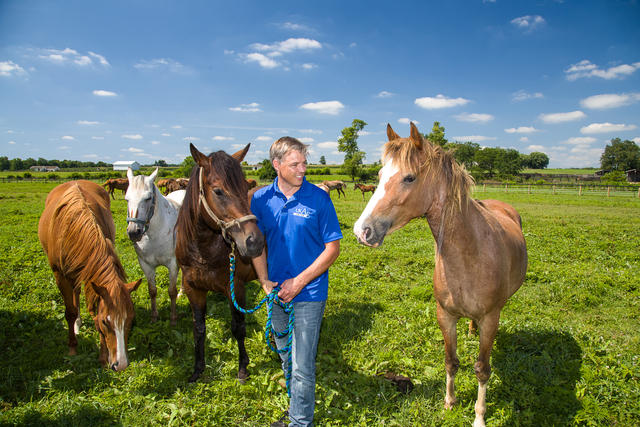Crowdfunding studies instrumental in securing five-year USDA grant
Crowdfunding studies instrumental in securing five-year USDA grant

The first research crowdfunding project launched at the University of Kentucky helped secure an approximate $2.1 million, five-year, multiple species grant from the U.S. Department of Agriculture.
In January 2014, Martin Nielsen, an equine parasitologist, veterinarian and assistant professor at the UK Gluck Equine Research Center, launched the crowdfunding project, “Let the germs get the worms: Testing a novel probiotic compound for treatment of equine parasites.” The project generated more than $12,000. Crowdfunding is a relatively new term that describes reaching out to the general public to meet a fundraising goal. Success in attaining the goal often depends on many individuals making smaller donations through a website.
As the name of the crowdfunding campaign implies, Nielsen’s research project focused on developing a novel bacterial agent for parasite control. Parasite populations are becoming widely resistant to commercially available dewormers, and there is a critical need for new and alternative treatments. The money raised in the campaign allowed Nielsen and his collaborators to conduct a number of laboratory tests with the bacterial products and equine strongyle parasites; results were very promising. The data was included in the proposal for the USDA grant and helped make an appealing case for an expanded research project.
“This shows exactly how crowdfunding can play a significant role in getting research funding. In addition to the publicity generated during the active campaign, crowdfunding provided a stepping stone for getting a larger grant,” Nielsen said. “With the limited amount of grants available for equine research, we need to be more entrepreneurial in our fundraising efforts. Crowdfunding represents one such strategy.”
David Horohov, chair of the Department of Veterinary Science, director of the Gluck Equine Research Center and Jes E. and Clementine M. Schlaikjer Endowed Chair, commended Nielsen for his initiative and efforts.
“It is gratifying to see how the novel initiative by one of our younger faculty members to use crowdfunding as a means of generating preliminary data has resulted in a significant award from the USDA for his research program. Dr. Nielsen should be credited not only for this accomplishment, but for the initiative and entrepreneurship he showed in procuring these funds,” Horohov said.
Raffi Aroian, professor at the University of Massachusetts Medical School, is the principal investigator of the USDA grant. Nielsen, along with researchers from Virginia Tech University and USDA, Beltsville, are co-principal investigators. The aim of the research project is to develop and evaluate a new bacterial agent for parasite control of farm animals (sheep/goats, horses, cattle and pigs) as well as humans. Nielsen’s laboratory will evaluate this treatment modality in the horse, while other collaborators will evaluate it for the other animals.
Intestinal parasites cause significant loss of health, productivity, reproduction, life and profits associated with large farm animals. In addition, more than 1.5 billion people are infected by parasites. Consequences in children include malnutrition, stunted growth, lower cognitive skills and immune defects; impact on adults can include poor pregnancy outcomes, lethargy and lower productivity.
The mission of the Gluck Center, a UK Ag Equine program in the College of Agriculture, Food and Environment, is scientific discovery, education and dissemination of knowledge for the benefit of the health and well-being of horses. The Gluck Center faculty conducts equine research in seven targeted areas: genetics and genomics, infectious diseases, immunology, musculoskeletal science, parasitology, pharmacology/toxicology and reproductive health.
For more information on the Gluck Center, visit http://www.ca.uky.edu/gluckL
Equine Livestock Research

